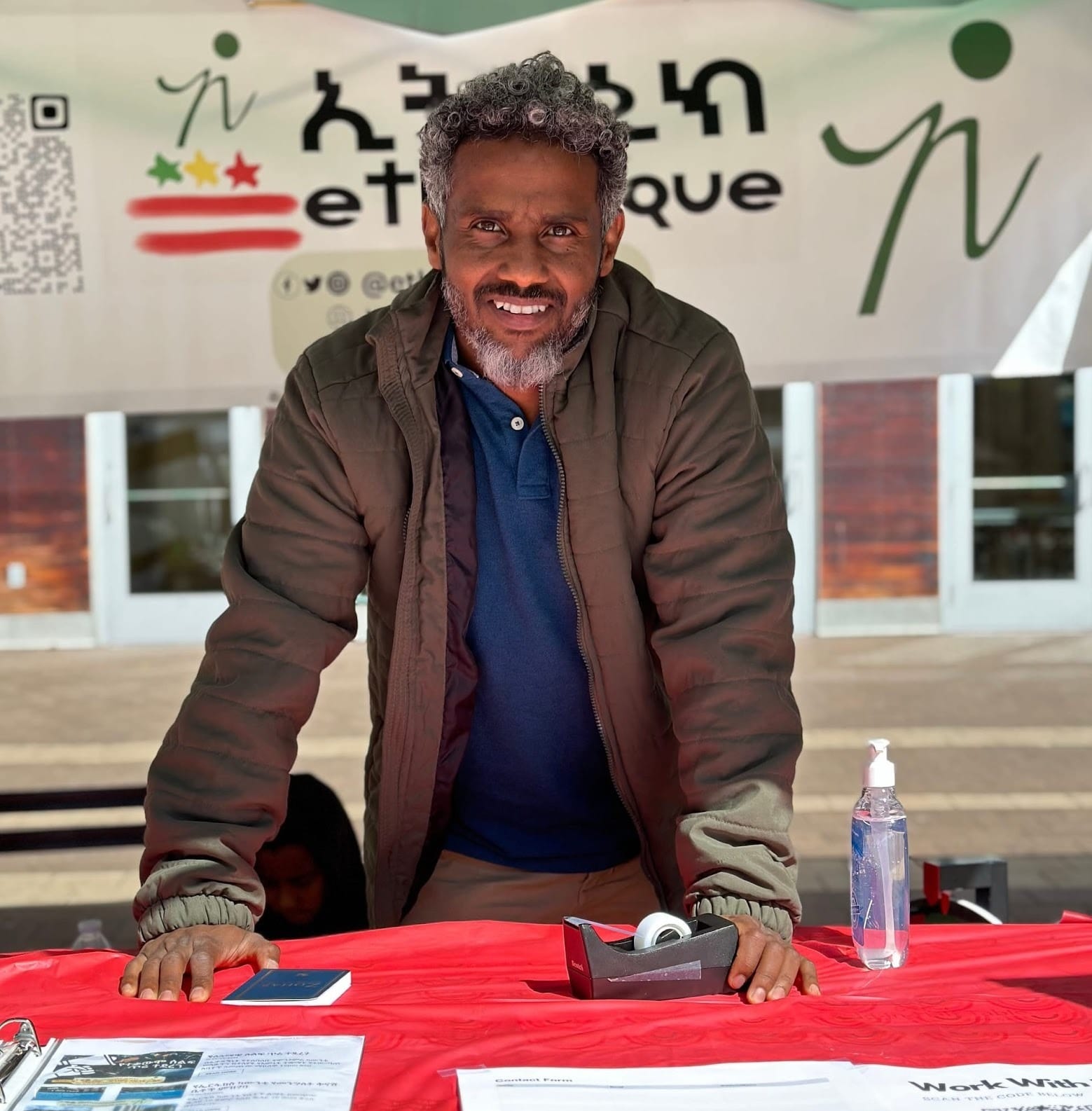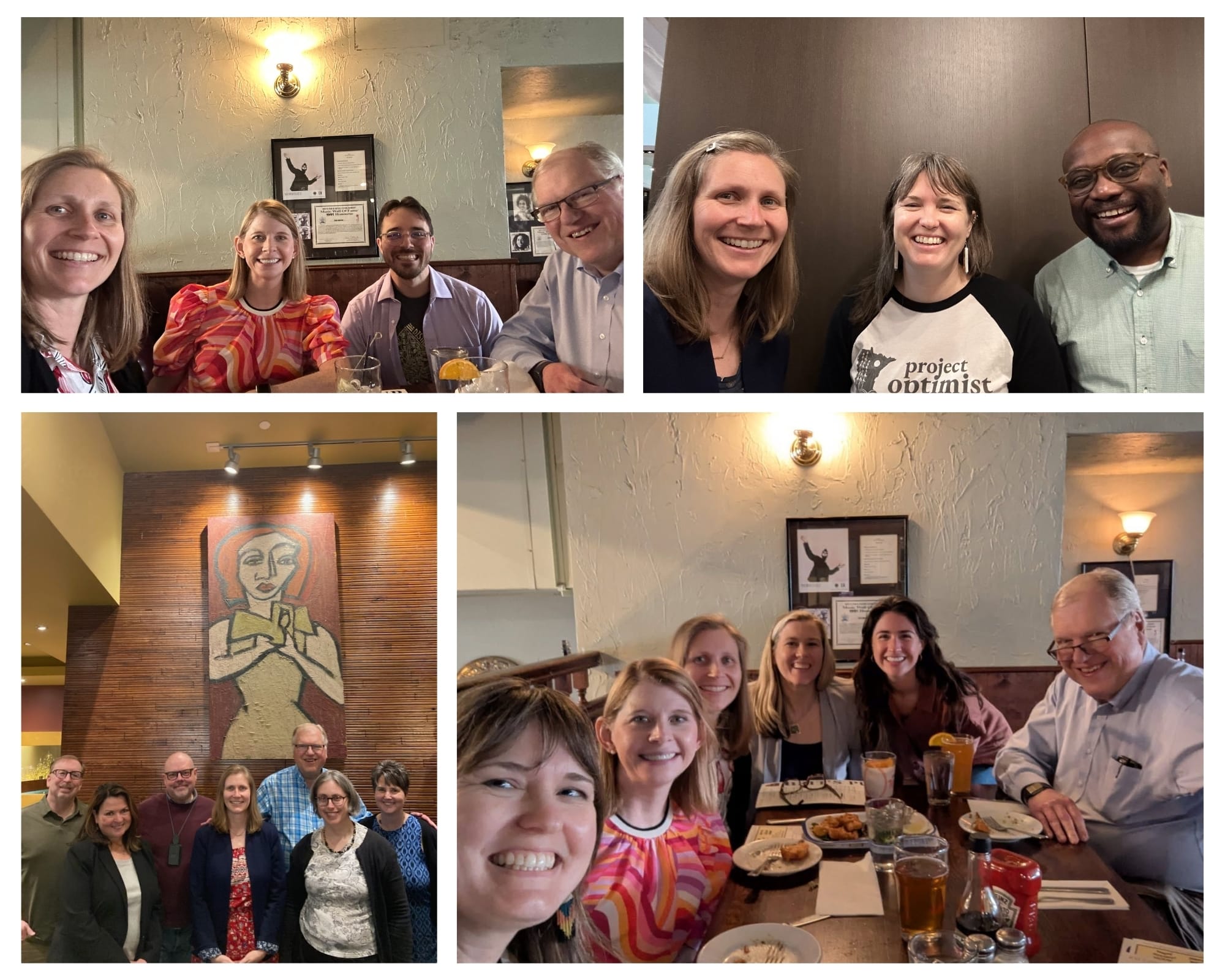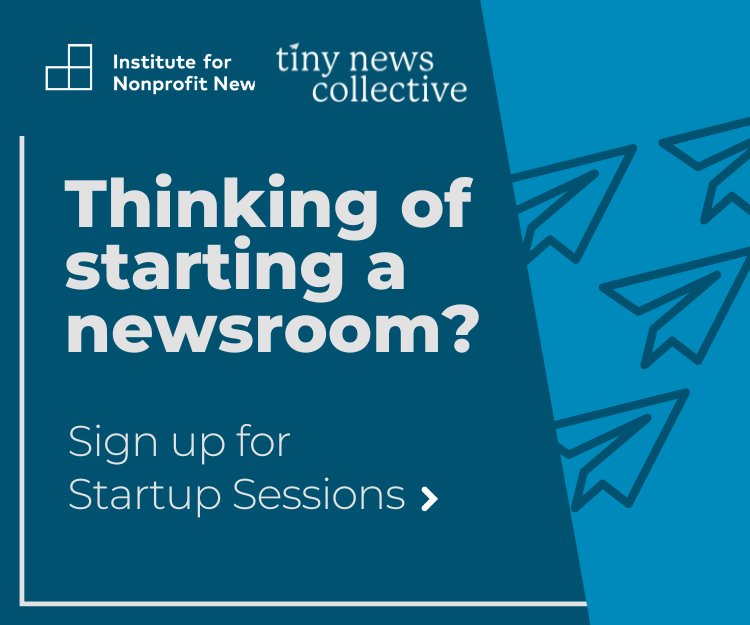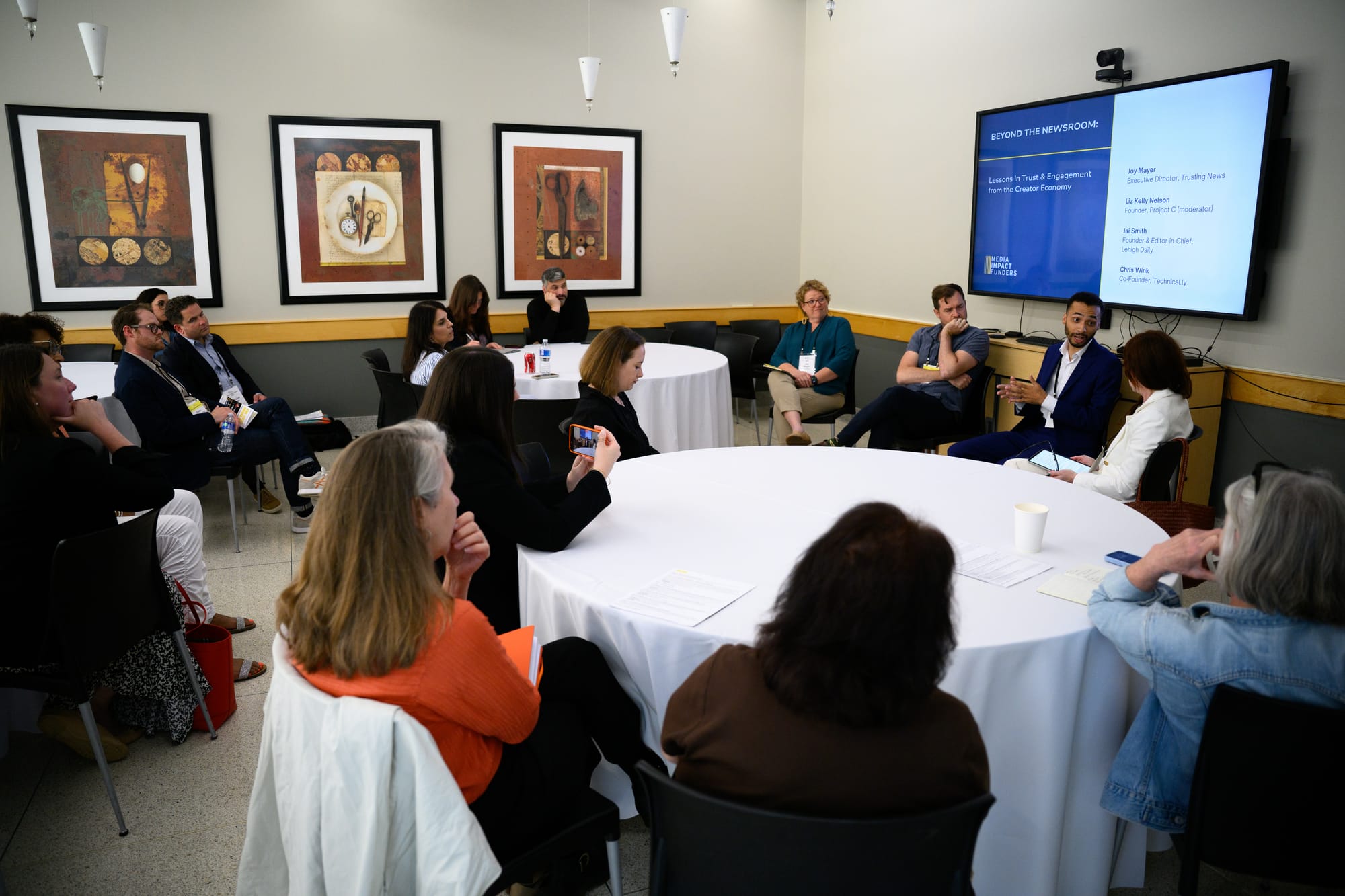
Helping news entrepreneurs and their communities flourish everywhere
By Erica Beshears Perel
At Tiny News Collective, our members come to us ready to work hard on a smart idea for news and information that’s missing in their communities. What they don’t have, often, is access to money. Bank loans and angel investors are few and far between in the rural counties, immigrant communities and working class neighborhoods they want to serve.
A little-understood but powerful way that Tiny News Collective lowers barriers and shows up for these founders is by unlocking their access to philanthropic dollars through fiscal sponsorship.
Fiscal sponsorship has been a popular and creative tool for funding artists, filmmakers and musicians for decades. It’s become more common in local news in the last few years, as philanthropy has played a larger role in funding news and as audiences have become more comfortable donating to their favorite outlets.
Here’s how it works: Charitable organizations (in this case, TNC) offer financial support and grant administration to for-profits (in this case, our members and clients) whose work serves the nonprofit’s mission. Newsrooms can raise grant funding and receive tax-deductible donations from their supporters under the nonprofit’s 501(c)(3) tax-exempt status.
Why fiscal sponsorship? It helps founders keep their options open.
Our members often come to TNC pre-launch or early-stage, and they haven’t decided yet whether to structure their business as a for-profit, nonprofit, worker-owned cooperative or something else. Fiscal sponsorship gives them access to grants and donations without having to make that decision right at the start, perhaps opting for a simple LLC structure.
Some news startups might want to remain as for-profit LLCs or other legal structures instead of becoming a nonprofit themselves. Applying for nonprofit status requires administrative costs and legal and accounting support and an unknown wait time while the IRS considers the application. Nonprofits also must have a governance structure in place that includes a board of directors that oversees the organization. Some entrepreneurs prefer to retain control of their business and the possibility of building wealth — something we have seen among many of our BIPOC members, in particular.
Others use fiscal sponsorship as a temporary measure to receive grants during their process of becoming a nonprofit business. We have supported members such as Mat-Su Sentinel and clients such as the Trans Journalists Association while they awaited their 501(c)(3) charitable determination from the IRS, and we celebrated with them when they reached that milestone.
Our member rate for fiscal sponsorship is just 3.5%, well below the industry standard of 7% to 8% for the form of fiscal sponsorship we offer, known as Model C. We offer that low rate because it’s part of our mission to lower the barriers to entry for news entrepreneurs, especially those folks without means who are covering underserved communities.
We also offer a client rate of 7% plus a $300 annual fee and an affiliate rate to LION Publishers members of 5% plus a $300 annual fee. We take on client projects for organizations that are mission-aligned with us but that aren’t a fit for membership because they’re more mature companies or don’t need our other services. That includes news organizations and also journalism-support and -service organizations. We see this avenue as a way to support the larger journalism landscape.
What do members and clients get with TNC’s fiscal sponsorship? Here are some of the services:
Fiscal sponsorship has been a boost for startups such as The Latino Newsletter, now its own nonprofit, and Project Optimist, which has raised money through fiscal sponsorship from McKnight Foundation, Press Forward and others. We fiscally sponsor several members that received transformative Press Forward funding.
In my six months as operations director of Tiny News Collective, I’ve gotten a crash course in everything that it takes to be a fiscal sponsor. I’m grateful for the expertise of Jason and Adam Huttler, the founder of the technology platform we use, as well as points of view shared by members on the occasional idiosyncrasies of having a third party manage your grant funds. It’s even more clear to me now that fiscal sponsorship is a critical part of what TNC does to build power for indie media and community-rooted journalism.
If you’re interested in joining TNC as a member or or applying for fiscal sponsorship as a client, learn more here. If you have questions about fiscal sponsorship, you can email me at erica@tinynewsco.org.

For our latest “5 Questions with…” feature, we caught up with Henok Mengistu, who founded Ethiopique in 2021 to serve the Amharic-speaking Ethiopian and Eritrean community in the Washington, D.C., area. The publication aims to bridge the information gap for the immigrant community by providing timely information, news and other opportunities in the language and the context that best serves the community. Henok talked about how a tornado warning led him to make Ethiopique a news hub. He also talked about a fruitful collaboration with fellow TNC member The 51st and El Tiempo Latino on an immigrant resource guide.
“We’ve grown to cover elections, housing issues, public health alerts and more. But the mission hasn’t changed: making sure our community is informed, respected and never left behind,” he said.
Read the whole profile here.

INN Days 2025 in Minneapolis was a whirlwind of activity, where our executive director Amy L. Kovac-Ashley got to meet up IRL (in real life) with members from Minnesota and other places around the country. She even spotted TNC's founding board chair André Natta. It was gratifying to see members connect with one another and share stories and insights.
Speaking of insights, Amy also had a chance to highlight the work that TNC is doing with the Tiny Vitals Metrics Lab in a session she moderated at the conference on new impact metrics to watch. She curated the panel of independent news leaders, and the theme was how news organizations from tiny to medium to large can look beyond page views and other growth metrics to include more meaningful impact measurements. Nieman Lab wrote about the session, which was standing-room only.

Tiny News Collective began a partnership with the Institute for Nonprofit News (INN) to offer startup sessions to anyone interested in learning more about creating a news and information outlet. In the sessions, we discuss the audience and business factors to consider and the practical next steps along the journey of becoming a news founder. Attendees also learn more about TNC and INN.
Register here for the sessions, where you can see all our summer dates, including July 8 and 22. Please share the link with anyone you know who might be interested in learning about creating an independent news organization. We would love to have them!

🚀At Tiny News, we love to see things launch. Be sure to check out the newest products to come alive:

We love to see our members get the funding and recognition they deserve. This month, there was a lot to celebrate! 🎊
💸Tucson Spotlight received a grant from the Community Foundation for Southern Arizona as part of its 2025 Local News Initiative.
👂🏽Mat-Su Sentinel reported back on survey results about news needs in the Matanuska-Susitna Borough of Alaska. The survey was funded by a grant from Listening Post Collective.
📹Planeta Venus received a $3,000 grant from the American Press Institute to work with local content creators, partnering with high schoolers to produce video interviews.
🏅 The 51st received a Dateline Award from the D.C. chapter of the Society of Professional Journalists for its story on opioids killing older Black men in the District at some of the highest rates in the country. The 51st also received its 501(c)3 nonprofit status from the IRS.

We love seeing our TNC founders out in the real world, giving talks, getting quoted and showing up in their communities. Here are some highlights from the past month:
🪧Kari Mar of La Conner Community News wrote about the “No Kings” protests and how important it is for journalists to cover them.
🫶🏽Nora Hertel of Project Optimist wrote about how the community “can become the helpers that Mr. Fred Rogers (and his mother) recommended we look for in tragedies” in the wake of political violence in Minnesota.
🔔Jai Smith of Lehigh Daily spoke at the Lenfest Institute’s Reimagining Philadelphia Journalism Summit on June 13 on the panel, “The Social Media Effect: Its Influence on News Engagement.” It followed another speaking engagement in Philadelphia at the Media Impact Forum, where Jai spoke on a panel called, “Beyond the Newsroom—Lessons in Trust and Engagement from the Creator Economy.”

Whether you are a fan of the traditional "Happy Birthday" song or other versions such as Stevie Wonder's, we used our singing voices many times over this month to fete our young news startups. This June, we celebrated first birthdays with these publishers:
Another member, Black Belt News Network, celebrated the 10th birthday of its sister publication The Selma Sun, a weekly newspaper in Selma, Alabama. 🎉
Altavoz Lab Community Journalism Fellowship
Altavoz Lab is now accepting applications for its 2025 fellowship program, launching on August 18. This opportunity is open to freelancers and staff reporters working in English or Spanish with community-based news outlets that serve historically disinvested communities. Fellows will receive grants ranging from $3,000 to $8,000 to produce an in-depth reporting project or series in seven months, along with up to $3,000 in additional funds for an audience engagement project. Apply by July 18.
Shifting Democracies Reporting: A Global Press Reporting Techniques Course
Global Press is offering reporters free access to its Reporting Techniques courses. The first course, Shifting Democracies Reporting, will launch in July. The course is designed for journalists reporting in complex political environments and will be offered in English and Spanish. Participants will learn how transparent, locally grounded reporting can cut through confusion, help communities better understand what’s at stake and build audience trust. The application for the July course is open now until July 10. Apply here.
Protecting the Truth: A Practical Safety Guide for Small Newsrooms from the Haitian Times
This guide, developed through a partnership with the Journalism Protection Initiative and CUNY Graduate School of Journalism’s Center for Community Media, outlines how small newsrooms can move from reacting to threats to building proactive, replicable safety systems.
LION expands its Sustainability Audits
LION is offering free, on-demand audits to its members. Publishers can complete a short questionnaire to receive customized feedback based on all the audits and recommendations previously conducted. The first 50 participants also receive a free hour of coaching.
Great journalism conferences this summer and fall
Get out and network at these upcoming conferences: National Association of Hispanic Journalists (NAHJ) (July 9–12), SRCCON (July 10–11), Asian American Journalist Association (AAJA) (July 30–August 3), National Association of Black Journalists (NABJ) (August 6–10), Indigenous Media Conference (August 13–15), The Association of LGBTQ+ Journalists (NLGJA) (September 4–7).
Thanks for reading the latest edition of the Big Blast from Tiny News. Be sure to follow us on social media to keep up with the latest from TNC and our amazing group of founders!
Follow us on LinkedIn: https://www.linkedin.com/company/tiny-news-collective/
Follow us on BlueSky: https://bsky.app/profile/tinynewscollective.bsky.social
The Big Blast Credits
Written by Erica Beshears Perel, with Mark Glaser
Edited by Amy L. Kovac-Ashley and Erica Perel
Sign up for our monthly newsletter for ongoing updates, announcements, and resources for newsroom entrepreneurs.